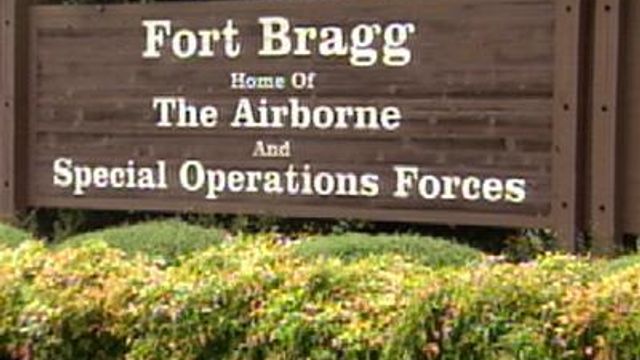US combat role in Afghanistan to end in 2013; Fort Bragg impact unclear
Defense Secretary Leon Panetta laid out the administration's most explicit portrayal of the U.S. drawdown in Afghanistan, saying Wednesday that U.S. and other international forces in Afghanistan expect to end their combat role in 2013 and continue a training and advisory role with Afghan forces through 2014.
Posted — UpdatedPanetta's remarks to reporters traveling with him to a NATO defense ministers meeting in Brussels showed how the foreign military role in Afghanistan is expected to evolve from the current high-intensity fight against the Taliban to a support role with Afghans fully in the lead.
The timeline fits neatly into the U.S. political calendar, enabling President Barack Obama to declare on the campaign trail this year that in addition to bringing all U.S. troops home from Iraq and beginning a troop drawdown in Afghanistan, he also has a target period for ending the U.S. combat role there.
Troops from Fort Bragg have been an integral part of that combat role. In October, while WRAL News was embedded with the 82nd Combat Aviation Brigade in Afghanistan, commanders said they believed an aviation presence will still be needed to maintain security and transport troops beyond 2013.
"We should not be setting deadlines," said retired Gen. Robert Springer. "It adds to the urgency of getting out, but it also adds to the urgency of the Taliban saying, 'Now we only have to wait 18 months and not 30 months as we anticipated earlier.'"
For Fort Bragg families, though, the timeline was welcome news.
"It's always frustrating for families back home (who are) worried, concerned," said soldier Jerica Carter. "Over there, they don't care if you have a family back here."
Panetta called 2013 a critical year for the Afghanistan mission that has dragged on for more than a decade with little sign that the Taliban will be decisively defeated. He noted that NATO and the Afghan government intend to begin a final phase of handing off sections of the country to Afghan security control in mid-2013.
"Hopefully by the mid to latter part of 2013 we'll be able to make a transition from a combat role to a training, advise and assist role," he said. He added that this "doesn't mean we're not going to be combat-ready," but rather that the U.S. and other international forces will no longer be in "the formal combat role we're in now."
About 1,700 U.S. armed forces members have died in Afghanistan over the past decade.
Panetta said the administration wants to make sure that the Afghan forces, after foreign troops depart, are "sufficient and sustainable," but noted that will require continuing financial support not only from the United States but also from allies and many other countries.
"One of the things we'll be discussing (in Brussels) is what the size of that (Afghan) force should be, but a lot of that will be dependent on the funds that are going to be put on the table in order to sustain that force," he said. "That's one of the things, frankly, I'm going to be pushing at this (meeting)."
A senior defense official traveling with Panetta said the U.S. believes Afghanistan will not need as big a force as is now being built. NATO has set a target of 352,000 Afghan soldiers and police. The official, who spoke on condition of anonymity under ground rules set by the Pentagon, said the U.S. thinks a smaller force would be adequate, but he would not be more specific
He likened this approach to the way Obama managed the final two years of U.S. military involvement in Iraq. Obama declared an end to the U.S. combat role there on Aug. 31, 2010 but kept tens of thousands of troops there through the end of last year to continue training and advising Iraqi security forces.
Panetta said no decisions have been made about how many U.S. troops would be required to remain there once the combat role has ended. He suggested, however, that large reductions, below the 68,000 troop level projected for this September, were unlikely in the months immediately after the shift. The U.S. now has about 91,000 troops there as part of the International Security Assistance Force. The fact that much military work will remain after 2013 "demands that we have a strong presence there," he said.
Although Panetta made no mention of it, U.S. Marines in Afghanistan already are making that transition out of a combat role. They are operating in Helmand province in southwestern Afghanistan, where the Taliban have been greatly weakened, and are on track to reduce their numbers significantly this year. Panetta's remarks indicated that this switch into a support role will be applied across Afghanistan, assuming no major setbacks against the Taliban and continued progress in training Afghan forces.
Many U.S. forces already are training and advising Afghan forces.
Marine Gen. John Allen, the overall commander of international forces in Afghanistan, has been talking publicly since last fall about converting the military role from combat to what he has called "security assistance." But Panetta went further in identifying mid- to late-2013 as the target for completing this conversion countrywide.
Panetta was in Brussels to attend a NATO meeting at which this and other issues related to the war in Afghanistan are expected to top the agenda. The session is intended to help pave the way for key decisions to be announced at a summit meeting of NATO heads of government in Chicago in May.
• Credits
Copyright 2024 by WRAL.com and the Associated Press. All rights reserved. This material may not be published, broadcast, rewritten or redistributed.





